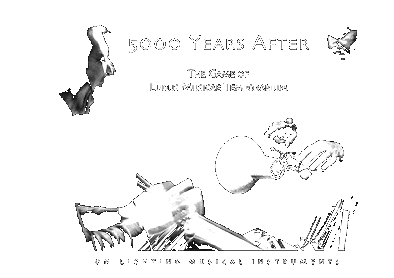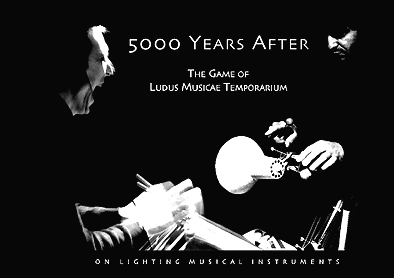
INTERVISTA N°131
MILANO 6.1995
Pascalina Pica : How did the idea of playing an Anglepoise Lamp occur to you ?
Mathius Shadow-Sky : I wanted to give a concrete expression to research undertaken on the Genoscopic Kalandar concerning the French pioneers of tape music : transforming the musique-concrète utopia into live instrumental music. Given its numerous sound possibilities, the Anglepoise lamp turns out to be the closest object to the original instrument described in the Genoscopic Kalandar : springs, screw bulbs, jointed arms, frame performing various operations, etc... all of these processes exploit the musical potential of any everyday object.
PP : How did you convince Vincent Favre to play the Anglepoise lamp with you?
MSS : Vincent Favre is the only long-time Anglepoise "lamplayer" I've ever met. Through performance our different personalities immediately intertwined. A felicitous encounter - all the more so in view of our contrasting techniques on the Anglepoise lamp.
PP : How did your work develop ?
MSS : About 15 years ago I discovered the Genoscopic Kalandar and I adapted it for Anglepoise lamps. The Kalandar is based on playful temporality concept and deals with 4 types of rediscovered games : competition, chance, vertigo and enactment. Each game category has its own set of rules with a free number of players. Different ways of playing are prescribed within this score : striking, scraping, plucking etc... on various parts of the lamp, with many accessories : bow, plectrum, sticks, elastic bands, vibrator, threaded rods, balls, marbles, superballs, nylon and steel thread, papers, chains, brushes, brooms, pebbles, blades etc... This is in order to achieve a great variety of sounds, performed through the playful spirit of the different categories of games.
PP : You've just started to answer a question I've been meaning to ask you : How do you manage to get such unheard of sonorities with so common an object ?
MSS : It is not so much the shape of the object or its function, common or extraordinary as it may be, which makes the sound. It is true that the contrast between a daily thing and the unexpected sounds may be surprising, even spectacular, but generating a sound from any object is first of all a gestural technique applied to the object to make it "alive". Mastering the gesture in its position, speed, pressure and rhythm.... while stroking, knocking, pulling, pushing or dropping...with the help of tools can only amount to a great sound richness. Discovering unheard sounds is the time adequacy between all that information; that is to say, at one point a sound comes out bearing no causal relationship with the prime gestural intention. Here is the origin of unexpected sounds. Such phenomena are then stored in our more or less perfect memories and their accumulation confers to this music such a particular feeling. With Vincent Favre, our first meeting about the Kalandar was to confront our technical experiences on the Anglepoise lamp in order to identify our respective emotions. The union of our differences went so well that music came out by itself, a real pleasure !!
PP : I feel a very strong time presence into your music, some kind of consciousness or memory bringing back feelings linked to childhood : the discovery of the real world, the infinitely small and the infinitely large, the feeling of an inner time, of subterranean times.
MSS : If you really believe what you are saying, then we have achieved our purpose ! Music is a materialization of time, a "time-being", no conception of life would be possible without it. From the existence of matter to the complex organization of humanity. Time gives us the manner; a certain freedom to move, to think, to conceive within a given space. In addition, we may notice that each civilization has a different conception of time through its spiritual approach. Indian civilization, for example, conceives time in cycles, a perpetual rebirth through reincarnation. In Africa, one cannot conceive of a distant future, but a continuous present in which ancestors and the past also accumulate. The conceptual basis of time gives a particular state of mind to organize daily life, and it leads to various customs you can meet on this planet. On the other hand, Western civilization has a historical, teleo-eschatological conception of time with a genesis and an apocalypse, a beginning and an end. This is, among other things, what gives us the feeling of drama, of urgency when events seem to oppose our morality. All of Western life is based on this scheme. A conception which does not speak, as it was, to other civilizations ! In music, mastering time allows us to travel and to understand connections between microcosm and macrocosm and it links remote practices through time. Music is a very powerful effective crucible for an intuitive understanding and acceptance of our own existence. Thanks to those time-links and through a kind of synthesis of different conceptions of time, you can free yourself from the unidirectional time of the Western world, to enter the multitemporal world of sound ; thus you escape the Western conception of time based on a dramatization of life, on our own final destruction ! The sensation of time leads you very far, and gives the possibility to discover the non-problems of a cultural group.
PP : Through your words, I can see that music is not an end in itself ; it is rather a means to tame a hostile world ?
MSS : The world is neutral, not hostile. It is a non-understanding of time conceptions that generates wrong feelings. I think that for the sake of mental health only the present moment is an aim in itself... What attracts me is to understand this world, to attain bliss through playing music.
PP : What is a show or a broadcasting of "2 lamplayers 2000 years after" like ?
MSS : In each adaptable place we recreate the games of the Ludus Musicae Temporarium. We have a diffusion system based on the superposition of different architectural acoustics as well as the displacement of sounds into those various architectures. The idea is to enwrap the audience into particular time-spaces and to magnify the different temporalities provoked by the particular forms used. We play like hazy appearances; a mask occupied by games; a pale darkness; so that the audience can sense this impalpable feeling, fleeting & playful; the eternal movement of matter, knowing that human beings are part of these movements : an uncertain time-space.
